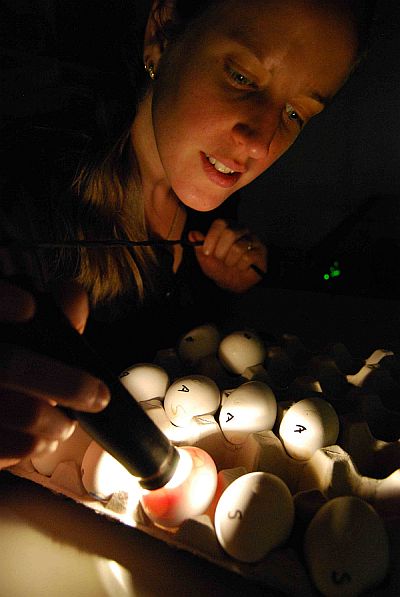The Poultry CRC asked Ms Kylie Hewson to provide an update on her PhD. What follows is her personal account of her research activities to date, in her own words. It gives us an insight as to the different directions a PhD can take you, what can be achieved within the poultry industry and the opportunities available to young scientists in this field.
I was employed as a research assistant by Associate Professor Amir Noormohammadi at the University of Melbourne in December 2007, after I had completed a Bachelor of Applied Science (Honours) from The Queensland University of Technology. I was hired to develop a high resolution melt (HRM) curve analysis technique for the detection and characterisation of infectious bronchitis virus (IBV) field isolates. This technique was integrated into the APCAH suite of poultry diagnostic tests and has been used since as the routine test for screening chicken flocks for IBV. Multiple variant strains of IBV were detected using this HRM technique, and the molecular characterisation of these new variant IBV strains formed the basis for my PhD project, which began in April 2009. I was awarded an APA scholarship, with a top-up scholarship provided by the Poultry CRC.
One particular isolate I discovered was found to be a recombinant strain, with its genome being composed of donor gene sections that were from very distantly related IBV subgroups. One of the donor strains has not been detected since the late 1980’s and was considered to have been outcompeted for growth in the field, but my work demonstrated that these strains are in fact still present in the field and are contributing to the evolution of new IBV strains.
Using the IBV HRM technique, I was also able to demonstrate anomalies with the IBV VicS vaccine. I formulated my proposed investigation into a grant proposal, which I submitted as my application for the ‘DAFF Innovation and Science Award for Young Scientists’ award scheme. The AECL sponsored my award and subsequently I was provided with the $20000 to perform my investigation, which involved a large in vivo experiment. Being awarded this prize was a highlight of my PhD, not just for the award itself, but also because it allowed me to pursue my research as an independent researcher. This increased my confidence in my ability to design scientifically sound experiments which are able to meet outcomes and answer questions raised by the poultry community (and also raise a few more questions!).
Further, my HRM technique aided in the discovery of avian nephritis virus (ANV), by demonstrating the absence of IBV isolates in field specimens from chickens thought to be infected with IBV. The clinical manifestation of ANV infection in young chickens is very similar to that of a nephropathogenic strain of IBV. As I was able to show that IBV was not present in these specimens, we investigated the possibility of another infectious agent, namely ANV, which was considered an ‘exotic’ pathogen and not supposed to be present in Australian poultry. As a result of my research, I published the first manuscript outlining the presence of ANV in Australia. This demonstrates how you can never plan the exact path of your PhD! Subsequently, part of my PhD has involved molecular characterisation of ANV isolates present in Australian poultry, with funding provided to our laboratory by the RIRDC to develop ANV immunoassays.
Currently, I am in the final stages of my PhD, which involves a great deal of writing and completing experiments. Early on in my PhD I employed the ‘get it written’ philosophy, so I have been writing my thesis since my first experiment! This has been advantageous as I have published manuscripts which form chapters of my thesis, which leaves more time toward the end the perform experiments and analysis. My final experiments are looking to characterise the transcriptome (the number and size of gene transcripts produced during virus replication) of these new IBV strains and compare them with reference IBV strains. This will hopefully identify genes which are over- or under-expressed in strains with different inherent characteristics (e.g. virulence).
I plan to submit my thesis by the end of this year (which would be a few months earlier than the 3 years provided for a PhD) and I plan to continue animal health research as a part of my career. I feel it is important in these early stages of my career to get as much experience as I can with as many different research techniques as possible, so I can be an effective independent researcher with knowledge of many different molecular tools. Along with research I have also found that I am passionate about education, and the few times that I have been asked to demonstrate or describe something to someone, I have strived to ensure that along with the transfer of knowledge I also transfer an understanding of the basis of the information.


